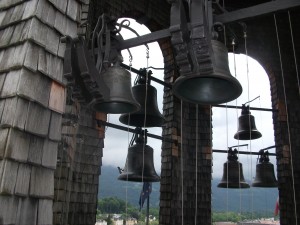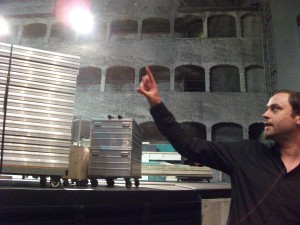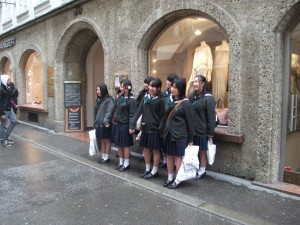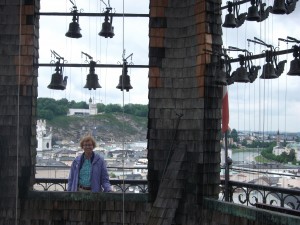
What I love about Salzburg are the bells. The city is full of churches that chime every quarter hour. Some hours bring extra chimes. There’s also a glockenspiel (carrillon) that rings a tune on the hour a few times a day. Walking down the street, you’re regularly surrounded by the sound of bells ringing from every direction.
The glockenspiel tune changes periodically, which Will and learned when we toured the glockenspiel. It was fascinating to see the mechanism, which is a giant version of those little music whirly-gigs that play a line of song. The tour would have been even better if we’d understood our tour guide’s German. The English crib sheet he gave us offered minimal detals. That’s the hazard of visiting a country when you aren’t fluent in the language.
Our last three days in Salzburg made me realize that, for travel, weather extremes are usually better than consistent, grey skies. We had far less rain during the second half of our visit, but the almost zero sun made everything look dreary. It also got colder. I was glad I’d brought gloves as well as tights to wear under my summer pants.
To make the most of those three days, we bought a Salzburg card, which gave us admission to a number of local museums and attractions. The card easily paid for itself, even though we spent a good part of one day on non-card attractions. One of these was the glockenspiel tour. Another was a trip outside of town to the ice caves in Werfen. These were high up a hill – a gondola took us up to a path blanketed in snow. The temperature inside the caves was about the same as out. A good activity for a cold, grey day, although the views would have been spectacular in the sun.

My favourite attraction with the Salzburg card was the tour of the music festival halls, conducted bilingually in German and English. This is the largest music festival in the world. It draws masses to Salzburg every summer. I was intrigued to learn how the concert halls, built into the mountainside, were formerly riding studios.
The guide paused for a long talk in the unique festival venue featured in The Sound of Music. He asked how many of the German speaking people on the tour had seen the movie. A few hands went up. He said that was more than usual.
Aside from the music festival, he said, The Sound of Music is the prime reason tourists from non-German speaking countries come to Salzburg. Yet, if you ask Salzburg residents if they like the film, most will say they hate it or they haven’t seen it but hate it. This is not because they are unfamiliar with the Von Trapp story or dislike the autobiographical book. It has been made into a German film that was reasonably popular.
The guide told us , as a communications student at the local university, he has the pleasure — or duty — this term of taking three courses devoted to the SOM phenomenum. He’s developed four reasons why Austrians hate the film.
(1) It’s Hollywood. I assume this means they see it as sentimental schmalz.
(2) It portrays the Von Trapps as the only Austrians who resisted Hitler (by leaving), while many Austrians stayed and fought Hitler. I don’t think the movie really does single out the Von Trapps. They just happen to represent that faction in the film. Also, Austrians, in general, did support, activily or passively, the Nazis takeover of their country. The guide added it’s natural for Austrians to not like a movie that recalls the worst part of their history.
(3) The movie is set in Saltburg, but not the real Salzburg known to its residents. Julie Andrews couldn’t run down a mountain twenty miles away and arrive at her abbey in 20 minutes. The mountain escape route walked by Von Trapps leads not to Switzerland, but to Germany.
(4) The movie is tolerable watched with German subtitles, but doesn’t make sense when dubbed. When the guide hears Julie and children singing Do, Re, Mi he wants to ask what medication they’re on and where can he get some.
But the bottom line, he said, is that Salzburg residents recognize the movie’s tremendous tourist windfall. SOM is the world’s best free advertising.

From the tour, Will and I strolled onto Salzburg’s main pedestrian shopping street. I noticed a group of Japanese girls dressed in school uniforms. Suddenly, they stopped walking, formed into choir lines and sang Do, Re, Mi to the utter enjoyment of everyone around.
For whatever reasons, The Sound of Music has touched people across the world. Someone should bottle its secret and prescribe a dose to every grumbling Salzburg resident.
